#disability in media
Text
So I'm having thoughts about LOTR. Specifically the ending. And the fanfiction that rewrites the ending. Bear with me.
So we all know that LOTR ends with Frodo leaving Middle Earth and going to the Undying Lands, right. And we all know that he does this because all the events of the story have had such an impact on him that they've left him quite traumatised and not really able to live life the way he used to. And we can probably all guess that this is a reflection of how Tolkien may have thought about his trauma after fighting in the First World War.
The ending makes sense considering the time the book was written, because in the 1940's and 50's, people didn't know as much about mental health and disability as they do now, and there weren't as many ways to help people manage disabilities other than institutionalising them or like. Giving them cocaine or something idk. So it's reasonable to assume that because Tolkien didn't see many ways that people could live with disabilities and be happy, he couldn't write them into LOTR and instead basically just put Frodo in Middle Earth's equivalent of Heaven and said "there you go, you're all better now".
I like this as a sort of tragic ending. I mean, you can't deny that someone being so drastically changed by an experience means they can't enjoy the things they grew up with is pretty tragic. The ending does make sense. But I kind of hate it.
I don't think it was written badly or anything, and I'm not trying to dismiss Tolkien's experiences that influenced this ending. My issue with it is that, when you look at it through a modern lens, it has vaguely ableist connotations. Specifically the idea that disabled people (Frodo) can't live full lives and be happy in the real world (Middle Earth) and can therefore only be happy when they're "cured" or when they die and go to Heaven (the Undying Lands).
Now obviously LOTR is an old book and it's important to consider the time it was created when analysing it, as you would do with any other piece of classic literature. A lot of old books have some outdated language and concepts in them, simply because that was normal back then. And until very recently, we probably wouldn't have thought the ending of LOTR was in any way problematic. And it might not have been, because it's not really the fact that Tolkien wrote that ending that's an issue; it's the fact that the way the world worked back then made it near impossible to even think about any other ending.
Since the book was written, though, there have been a lot of advancements in science and research into disabilities, and there are now much more effective ways to treat and manage them. There's medication and therapy for physical and mental issues, and there are lots of accommodations that we can and should put in place to make life easier for everyone. Back in the 1940's, Tolkien wouldn't have had these things, and therefore didn't consider them to be options when writing about what happens to Frodo at the end of the story. But now, we do have them, and it's this progress that has discredited the idea that disabled people can't be happy in the real world, and subsequently made LOTR's ending seem outdated by today's standards.
Now this is where the fanfiction comes in.
LOTR readers these days, who are aware of the progress we've made as a society and the new ways people view and treat minorities, often write fanfiction that puts things into Tolkien's universe that wouldn't have otherwise been there because of when the books were written, from openly queer characters to characters living good, happy lives with disabilities. And I think this is a good thing and it's really nice to see, especially in regards to Frodo's disability. I like seeing people work out how he might accommodate himself in the world of Middle Earth, and how the other characters would help him with that. I like that sometimes people have to get creative when figuring out how he would cope with trauma and chronic pain, because obviously Middle Earth doesn't have a lot of the things we have in the real world.
I like that we can finally give Frodo a chance to recover in a more realistic way than just sending him to the afterlife. I like that we can finally allow him to live.
A lot of Tolkien purists complain about new adaptations and fanfiction because "it's not what Tolkien wrote so he wouldn't like it". First of all, why do we still care about the opinions of a man who's been dead for over fifty years? What are you going to do, summon his ghost to haunt all the fanfic writers? Hold a seance to find out exactly what he thinks? Good luck with that.
Second of all, I honestly believe this is something he would approve of. He went on living after the First World War, but he didn't get to live with the disability accommodations we have today. And because he didn't, neither did Frodo. We can't give Tolkien the life many disabled people have now, but we can give it to his tragic hero. We can make his story a little less tragic. And if Tolkien was here now, of all the tropes we're using in LOTR fanfiction, it wouldn't surprise me if "Frodo stays in the Shire" is one he could get behind.
#lord of the rings#lotr#frodo baggins#tolkien#disability#disability in media#disability in fiction#fanfiction#i'm back on my essay-writing bullshit#this just came to me like five minutes ago and i wrote this instead of doing what i should be doing which is showering#so that's fun#just articulating my thoughts over here don't mind me
22 notes
·
View notes
Text
The Jaws Effect and what it means for media representation
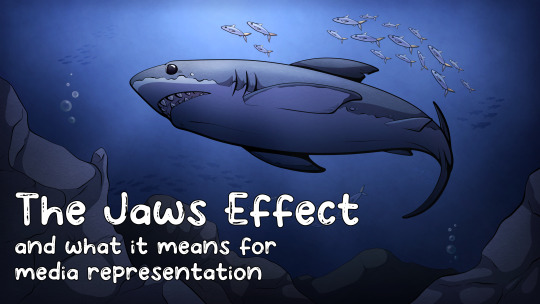
The Jaws Effect is the name of a phenomenon that described the panic and fear that sprang up around sharks, fuelled by Steven Spielberg's movie, Jaws. While the fear of sharks and other marine predators had always been a thing, Jaws launched the fear of sharks, and Great White Sharks in particular, to new (and mostly unfounded) heights. Most people will never encounter a real-life shark and so their only knowledge about the creatures come from movies and other forms of entertainment. Entertainment that largely portrayed them as mindless, unfeeling killing machines. After Jaws, sharks became a staple in the creature-feature genre of movies, which only perpetuated the idea of sharks as dangerous monsters even further, reigniting and reconfirming the beliefs the public held about them in the process. These ideas about sharks are, of course, not true, but the misconception and fear has had a real, observable impacts on shark populations, shark conservation efforts and even laws and legislations surrounding sharks and shark conservation around the world.
Ok but Cy, this is a blog about disability and disabled representation, what do sharks have to do with anything you talk about? Well, Because The Jaws Effect is just one of many examples that shows how massive of an impact representation in the media can have, for better or for worse, especially when talking about subjects the public generally knows very little about.
This conversation is not unique to disability representation, nearly every person I've seen who's talked about how to write and design characters from any minority brings it up eventually, but the media we consume, the movies we watch, the books we read can all have big impacts on people's perceptions on those topics. When talking about disability specifically, it's an unfortunate reality that not many people know all that much about us, and so, much like sharks, for many, their only real exposure to disabled people is through the media they consume.
If you don't know anyone in a wheelchair, and your only knowledge of life as a wheelchair user comes from books and movies like Me Before You, of course you're going to (spoiler) come away thinking that life in a wheelchair is horrible and death is better than living like that. If you don't know any DID Systems and your only exposure to a condition like that is through movies like Split (and honestly, a number of other horror movies and crime shows) of course you'll think people with DID are unstable monsters who could become violent any moment. If your only exposure to autistic people is Music, then it's not shocking that you might think Autistic people are "trapped in their own minds," completely unaware of the world around them and lacking any kind of agency. As much as I'd like to be able to say these are "just movies" or "just books," and that if we don't like them, we can just not watch them, they all had an impact on the real world and real people's perceptions of the disabilities they depicted, as do the many, many smaller examples of bad representation.
This is why I personally spend so much time focused on the portrayal of disability in the media, why so much of my content is focused on creating resources for creators to represent us better, and why I think writers, artists and other types of creators should care about the representation they include.
Unfortunately, people believing misinformation and stereotypes, while annoying, isn't the worst of the impacts bad rep can have. If a stereotype is prevalent enough, and enough people believe it, it can both put us in harms way and cause us to loose access to things we desperately need and things designed to help us. One really common example of this is when movies and TV shows show a character getting up out of their wheelchair, and use this as proof that the person is faking being disabled. However, in reality, there are many disabilities that might mean someone has to use a wheelchair, even if they can still walk a little bit or stand up. The stereotype of someone standing up from their chair being a fake, especially when it's reinforced over and over again in the media, leads non-disabled people to believe that anyone who stands up from their wheelchair is faking, and results in a lot of real disabled people being harassed and denied things like access to disabled parking, toilets and other accessible spaces. There were even a few cases of people reporting those they see get out of their wheelchairs to Centrelink (The Australian "welfare" department, for those not familiar) as frauds, and while these investigations don't usually go far before someone realises what's happened, it has, on occasion, resulted in people loosing the income they depend on to survive, even temporarily.
But the impact of representation, of course, can go both ways.
I was in high school when the first How To Train Your Dragon movie came out, and at the time, I didn't really like people being able to see that I was a leg amputee because I was sick of kids in particular staring, pointing at me, asking their parents "what's wrong with them?" or asking me directly, "what's wrong with your legs?". I wore long skirts and big, bulky tracksuit pants to keep my legs covered, something that became dangerous in the hot Australian summer, but I didn't care.
But the impact of How to Train Your Dragon came in two ways. The first, was that it was one of the first times I'd seen an amputee (or rather, multiple amputees) who didn't keep their prosthetics covered or hidden, and it gave me the little boost in confidence I needed to do that myself and wear clothing that was more comfortable and functional. And second, the comments from children changed, albeit slightly, but enough that it was noticeable. The questions and comments went from "what's wrong with you?" to "oh cool, your legs are like Hiccup's!" I even had one little girl ask me once if I had a pet night fury. They went from being scared of me and my legs, or at the very least concerned for me, to genuinely curious and impressed. While reactions like that did become less and less common over time, they didn't fully go away either. Even today, I occasionally get young kids asking me why I have legs like hiccup. A friend of mine who was born with one arm shorter than the other and without fingers on that side had a similar experience with the movie Finding Nemo. Her disability was a bit more complex than what I described here, and she always found it hard to explain "what happened" to small children, however, after Finding Nemo came out, she was able to simply tell kids "this is my lucky fin, like what nemo has!" and that was enough to take her from someone "scary" to these kids to someone like their favourite characters.
Of course, it's much easier to see the impact positive representation can have on people's perceptions when we're talking about kids media, but it's not exclusive to it either.
When it comes to a minority like the disabled community who are so thoroughly misunderstood by the wider public, misinformation can and does spread easily. What people see and read in the media they consume plays a big roll in how people perceive the real people attached to the stereotypes. We often hear people say "Fiction imitates life" but the reverse can and often is also true, life can imitate and be influenced by fiction, and those of us creating should be mindful of this, especially when we're talking about a group of vulnerable people.
[Thumbnail ID: An illustration of a Great White Shark swimming near the rocky bottom of the ocean, surrounded by silver fish. In the bottom left corner of the image is "The Jaws Effect and what it means for media representation" in big, white bubble text. /End ID]
#Writing disability with Cy Cyborg#Disability 101#Long Post#Disability#Disabled#Disability Representation#Writing Disability#Writing#Writeblr#Authors#Creators#Writing Advice#Disabled Characters#Disability History#On Writing#Disability in Media
761 notes
·
View notes
Text
On the one hand yeah, Tim faking a temporary disability to get Vicki Vale off his back as she tries to prove he’s Red Robin is ethically dubious. But like... vision impairments are a disability, which means in continuities where the glasses don’t block out his excessive sensory input and he’s not claiming they’re a fashion statement, Superman is faking a disability every time he goes out as Clark Kent. So if we’re gonna be all “Tim wtf” we should also go “Clark wtf”.
On the much more interesting hand, asplenia is also a disability, which the writers canonically gave Tim. While he totally can be a vigilante with it, he needs to take more precautions than he would otherwise, and it wouldn’t be too hard to convince the general Gotham public that actually no, Tim Drake-Wayne being asplenic means he’s definitely not Red Robin, Vicki, what are you smoking, don’t you know how often the vigilantes get tossed in Gotham Harbor? Do you know what’s in that water?
Which means that now I want an AU in which instead of faking getting shot, Tim just has Wayne Enterprises launch an Asplenia Awareness campaign in conjunction with the Martha Wayne Foundation starting a program to get other asplenic Gothamites their antibiotics, throws a bunch of fundraisers for it, and stares Vicki Vale dead in the eyes while taking his new meds on camera.
#disability in media#ableist tropes#they already do a lot of shit like invasion of privacy and aggravated assault so like#the faking of a disability is messed up but it's not really any more messed up than anything else they're doing#Tim Drake#Red Robin#DC#Batfam#the writers did not explore the full potential of what that stabbing did to Tim#and my asthmatic ass is very disappointed in them#get out of our way we're disabling the text
732 notes
·
View notes
Text
As a disabled person... a disabled person since I was very young (age 2) and will be until I die... I like stories that portray disabled people accurately. It's why I devote a lot of my writing to people with disabilities or chronic illnesses, because I feel like it's important. We don't get to see accurate depictions of ourselves in media, and that representation is dearly, desperately needed, which is why I write them.
I like stories that are well researched, appropriate to the condition, and display a breadth of knowledge on the subject. I like stories where the disability is true, real, and doesn't magically get better.
But... as a disabled person with chronic pain, who requires regular, painful surgeries and procedures to keep me alive... I also like the stories where there is a magical fix. I like stories in which the characters who are suffering and in pain, no longer have to suffer or experience pain. Because I dream of a time and place in which I no longer have to suffer or live through the pain of my conditions. And I don't feel like it's wrong to feel that way.
I can like both. I can appreciate both. I see the value of both. And I know there are a lot of disabled people who disagree, that fiction should be true to reality in terms of disability, and I understand and respect the argument. I understand why they feel that way, and to some extent, I agree. But fantasy is fantasy for a reason, and I can do or say or be anything I want to be in fiction. What I want is to see myself, but sometimes, I want to see a version of myself that isn't suffering. And I don't think that's unfair.
#Personal#The Traveler Speaks#Disability#Disability in Media#Disabled Representation#please feel free to reblog
198 notes
·
View notes
Text
You don't get it, do you?
If you say that Izzy's death was a beautiful conclusion to his arc, that it was kind. You just. You don't fucking get it.
You don't get to say shit like that if you're able-bodied, and then ignore those of us who are disabled, and who liked Izzy, and are now angry and saddened by his death.
Do you think it was, I don't know... A humane way of ending things?
Well. If that's the case then, first of all, I don't want you anywhere near me. Second of all, I want you to sit with yourself and think, but like really think, about why you think it's more humane to kill off a physically disabled queer character rather than, I don't know, let him live out the rest of his life happily, getting more and more accustomed to his disability, overcoming his trauma and enjoying his life to the fullest.
Queerness and disability rarely intersect in media, unlike real life. For a few episodes, Izzy's arc gave so many of us hope. It was a beautiful, dazzling story of a man who's been through unimaginable horrors, who was only just starting to overcome his trauma, finding love, acceptance and community.
Do you know how rare it is to witness a story like that? To see yourself in a character, in a way that you've never felt seen by media before?
Now, can you imagine how much of a slap in the face it was when he died? And a death that, I might add, wasn't necessary for anyone's development, was anticlimactic, cruel, and, perhaps the most importantly, came way too early?
So, you don't get to tell us that we're overreacting after Izzy was killed off. You don't get to do that, because you just don't get it. We're hurting, and for a good reason. Because it's vile, and because if we don't speak up against it, nobody else will do it for us. You can sit in your own little corner, telling yourself that the season finale was good and satisfying, and that you're happy with the way it ended if it's indeed the series finale.
Meanwhile I'll stay here, thinking about how a beloved, queer, disabled character on a beloved queer show was put down with a gun like a horse with a broken leg.
But that was the kind thing to do, wasn't it?
#izzy hands#ofmd critical#ofmd s2 spoilers#ofmd s2 finale spoilers#disability#disability in media#ableism#ooooh weeee#i woke up and chose violence today lads#>:)#but yeah#i felt that i needed to get this out#because it's only now really hitting me how fucking shaken i am because of all of this#so yeah#i'm not off my bullshit just yet#probably won't be for a WHILE#bleh
323 notes
·
View notes
Text
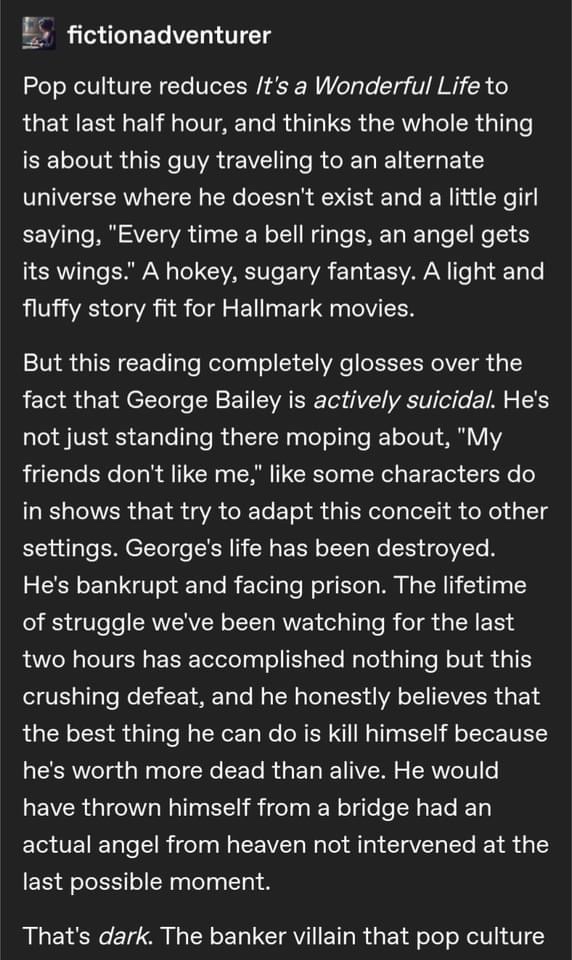
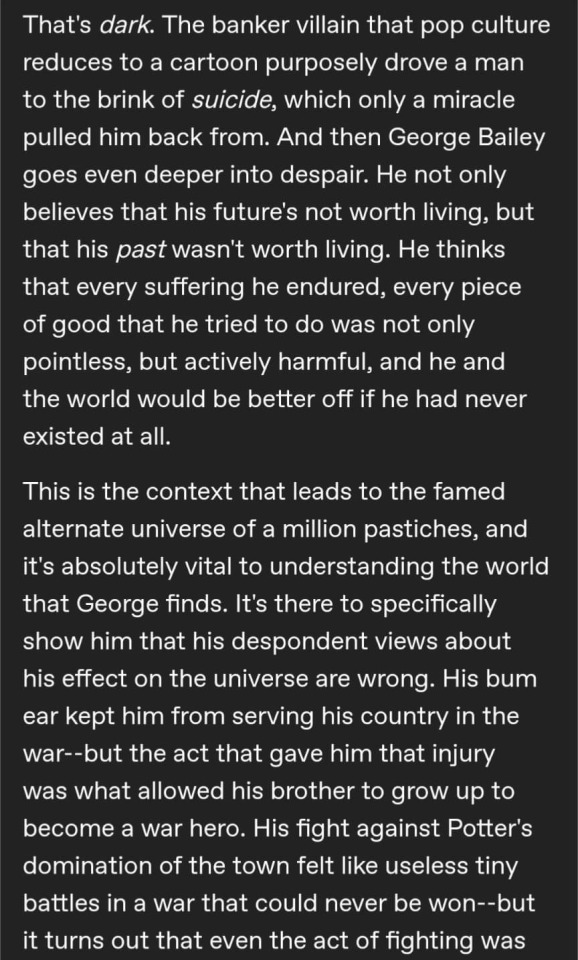
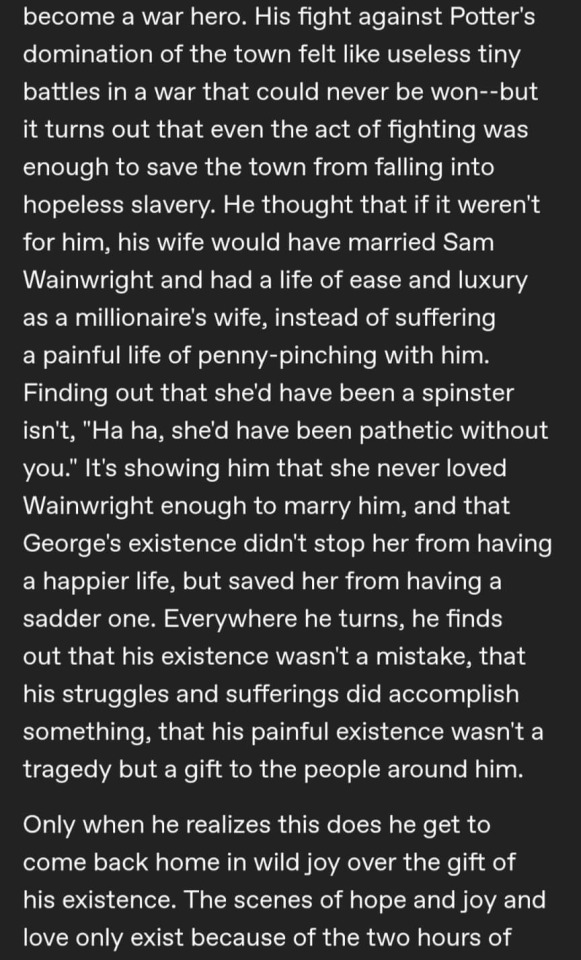
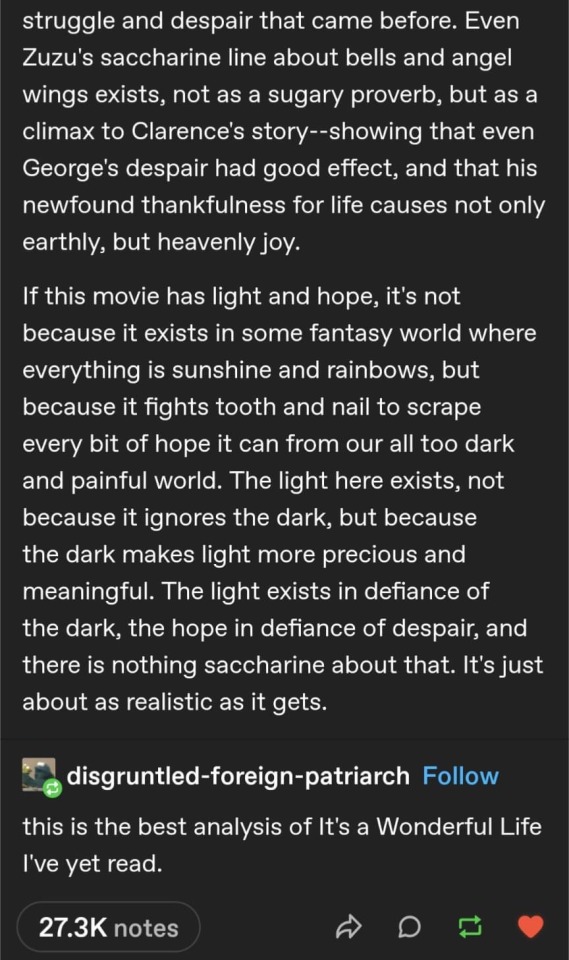
YES.
ALL OF THIS.
THIS is why this film still hits so hard after all these years.
It’s not some sugary BS about “you can think yourself out of suicidal depression by just learning to appreciate what you’ve got”.
It’s about the fact that people who work really fucking hard for their communities experience active, targeted, criminal pushback from exploiters.
About the fact that caring, in all its manifestations, is incredibly physically and mentally taxing and is often done by disabled people - YES, George Bailey is a disabled protagonist. His impairment prevents him from military service and actively causes him chronic pain that, as a person who lives with it, *will* affect his energy levels and fatigue constantly.
Notably, IAWL actually has a bunch of disabled characters. Not only is George disabled, but I’d put money on his uncle who loses the money being ADHD and very possibly having other learning disabilities and the film *actively* flagging that fact to the audience, even if it doesn’t necessarily know what ADHD is.
Which casts a whole new light on its principal villain being disabled. Instead of Old Man Potter being a flat caricature of “disability = evil”, what he *actually* is is a fantastic example of the fact that marginalisation in one axis does not prevent someone being an active oppressor - and wealth and class privilege, in particular, tend to mean a person actively acting to oppress other people who share their marginalisation in order to privilege the interests of their own class as a whole. Sometimes even damaging their own individual interests to do so.
It’s also super interesting that the *material* miracle in the film is not the appearance of an angel to show George what life would have been like if he had never existed, but the *community solidarity* that saves him from jail and his family from penury. The supernatural intervention can change his *mindset*, and that is *incredibly* important, given it *literally* stops him killing himself, but the *material* intervention is mutual aid from his own community that he has given so much to.
Which is incredibly radical as a message. It’s not saying “faith is worthless”; it’s saying “faith can be an incredibly important factor in creating resilience in moments of despair, but we can’t, and *need not*, wait for a supernatural miracle to save us; we have the capacity to save ourselves and each other in our hands right now”.
#it’s a wonderful life#film criticism#disability#disability in media#mutual aid in media#george bailey#wow I know I liked it’s a wonderful life but apparently my feelings are way stronger than I appreciated#why I fucking hate sugary reductionism in pop culture sometimes#fuck I love this movie#disability in film
176 notes
·
View notes
Text
Stop Using Slurs in Children Stories!
I bet that caught your attention. You might be thinking, what stories use the N-word, or the F-word, well...none that I found. However, there are two slur words that are often used in writing mainly in children's literature because I don’t think enough people know them to be slurs. Those words are cripple and savage.
Before I begin, I need to address a few things. First, I'll only use these words in full for educational purposes so nothing gets confusing. Secondly, I’m not hating on any of these authors. I genuinely think these people might not know cripple and savage are slurs. However, I still need examples of what I’m talking about to explain how common these words are used in writing as well as explaining why it’s a bad idea to use them, so I’m using these authors, not as targets but as examples based on the books I have.
Both of these words (cripple and savage) have a lot of history behind them, and while I strongly suggest, not using them, if for some reason, they have to be used, you need to hire a sensitivity reader who’s a part of the communities that has been affected by said words before you publish your story.
Cripple:
Before I begin, please understand I’ve consulted with a disabled person who’s well knowledgeable in this topic to help smooth out my points. I’m not apart of the physically disabled community. As I’ve been told there’s a big debate going on within the disabled community in regards to if mental disabled people are allowed to use the word cripple or not. This is beyond my understanding of the word, and the community so when I mention the word cripple, I’ll be referring it to the physical disabled community and not the mental one. Everything I’m about to say has already been said by the physically disabled community. I’m not adding anything new or talking over them. If you would like to know more about the language of disability, please read Cy-Cyborg’s article on the matter: https://writingwithcycyborg.blogspot.com/2024/02/LanguageOfDisability.html
Cripple is a world that’s defined one of three ways, to either describe someone who can’t function properly, to describe a situation that’s overwhelming, or to describe an object that isn’t working.
Example one: DragonFire: Sphere of Eternity (book 1)

“I mean, this morning, no offence, you were crippled.” (Describing a person.)
Example two: “The economy was crippled.” (Describing a situation)
Example three: DragonFire: Age of Legend (book 3) (describing an object)
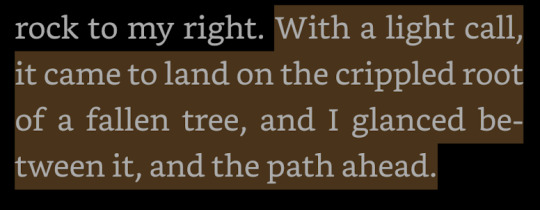
The word cripple, even when it was used in a medical sense has always been a word to punch down and insult the physically disabled community. It was used to attack them and point out their disabilities. It became a common replacement for the word injured because it has a more of a punch. Instead of calling someone “severely injured” use cripple instead, it’s shorter and a lot punchier of a word. Over time it became part of normal vocabulary to use it while describing something as severe, despite it still being used as an insult at the same time. Let’s look at an example of how it’s being used to describe an injury in Robert Vane's A Dragons Chains: Book one of the Remembered War

“I moved my three non-crippled legs…” In this example, the dragon has an injured leg. Why did the author use the word cripple instead of injured? I think it’s because of shock value. Is it cheap shock value? Yes, but shock value for the reader is still shock value. Tell me, what’s the difference would be if the author replaced the word cripple with injured? “I moved my three non-injured legs...” Does using the word cripple add to the sense of urgency? Add to the sense of how injured that character's leg is? Or was it merely just a place for shock value?
But how often is this word used? Let’s take a quick look at the DragonFire series. There are currently four books in this series at the time of writing, and the word crippled is used twelve times throughout four books. Knowing it’s a slur...that’s a lot.
Some of the examples in which it was used are in things such as DragonFire: Fallen Star (book 2) where it reads:
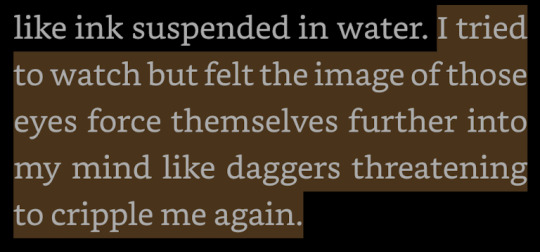
Or
“...he yelled, his scythed tail coiling round, only for the far less crippled dragon to kick him off.” DragonFire: Order of Enishra (book 4)
It’s not just the DragonFire series which does this, other examples include, The Last Monster on Earth by LJ Davies
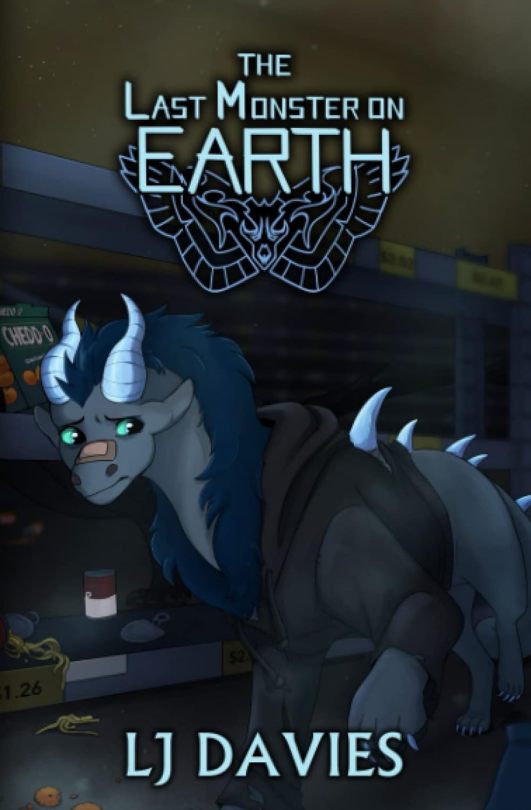
Which uses it four times in one book with examples such as “Lock these two in the truck with the cripple…”
Warriors: Forest of Secrets (book 3) has this line. “As Fireheart said goodbye to Yellowfang and went back to hunting, he felt a new surge of determination to bring Tigerclaw’s guilt into the open. For the sake of Redtail, murdered; for Ravenpaw, driven from the Clan; for Cinderpaw, crippled...”
And even Wings of Fire, one of my favourite book series uses it.
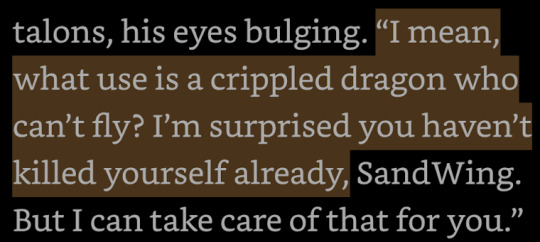
Here’s a question for you. Is it ok to use that word if the impact is meant to be insulting? In the Wings of Fire example, Queen Scarlet defeats Dune in combat, and is about to kidnap the main characters. Dune, still breathing can barley move upon which Scarlet killed him. Scarlet is one of those pure evil types of characters, this is something I could see her saying, but let’s take a step back and put your eyes in the eyes of a disabled child.
Here you are, a disabled child. You already know what the word cripple is, and it’s been used against you (don’t act like this doesn’t happen). You read Wings of Fire and you come across that sentence. What is the intent behind that sentence in the eyes of a disabled child? Are you supposed to be scared of Scarlet? Angry? Or are you upset, because even in a fantasy book with talking dragons, you can’t escape from real life or that word?
Some of you might say, “What if only the villains use that word?” While I can see Queen Scarlet calling Peril a stupid retarded motherfucker. It’s not something you want in a children's story, so why does cripple get a past?
I hope you’re getting the picture, it’s a very commonly used word, one which the disabled community has begged able-bodied people not to use. The word injured gets the same point across and it doesn’t have a history of it being a derogatory term. While replacing the word cripple with injured or severely injured isn’t a perfect fix, it’s at least getting rid of the other word which is a start at least.
Now before I continue with the other slur, I can hear some of you say you’re aware disabled people are using cripple to describe themselves. Why can’t able-bodied people use it? Here’s the thing. Not everyone in the disabled community is doing this, and it’s not a monolith. The word cripple has been used as an attack against the disabled community for decades. It targets them, puts them down, and it’s only used against them. You only use the term to refer to something as injured so there's no reason to use it on an able-bodied person. The community in which it was used against is taking that word and trying to empower it amongst themselves. You’re not gonna complain if someone who’s black uses the N-word, so why are you upset when disabled people use the word cripple to describe themselves but are saying you can’t? That word belongs to them and their community, not yours. Also, one more thing before I go, not everyone in the disabled community uses this word or wants to hear it. There have been plenty of disabled people who are fine using that word to describe themselves but won’t say it around others if other disabled people express they don’t want to hear it. So be mindful if you’re gonna use it and please hire a sensitivity reader.
Savage:
This word...I have a lot of history with it because it’s a word that’s used against my community, (indigenous) people. And yet, just like the word cripple, it’s used all the time and while it’s a very common occurrence where indigenous voices aren’t heard, we’ve been telling everyone to just drop this word. Unlike the word cripple, we aren’t trying to claim this word, we just want it gone.
The definition of this word is an easy one to understand. It’s to describe a person, object, or an action as barbaric, wild, aggressive, unintelligent, or barely even human.
Example one: “They’re savages, savages, barely even human” Disney, Pocahontas (1995). (Used against people)
Example two:DragonFire: Age of Legend (book 3) by LJ Davies
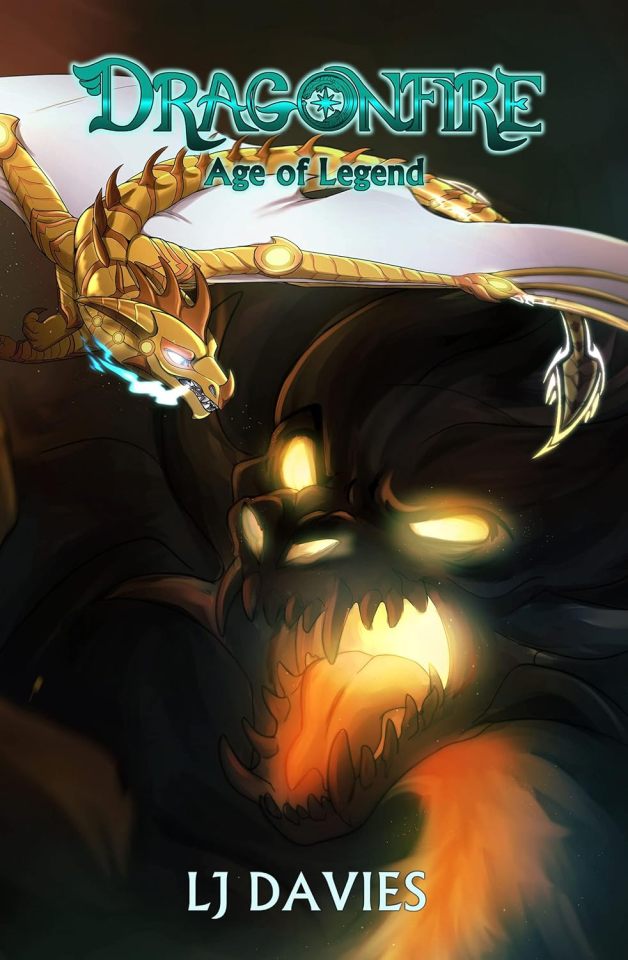
“I opened my muzzled to respond, but another savage roar drew our attention…” (Used as an action)
Example three:

(Used against a group of people)
Example four: “Savage weaponry” (Use to describe an object)
I’m gonna be using the series DragonFire a lot for my examples, because out of all the books I got, that series uses the word 19 times throughout books one, two, and three. It was used twelve times in book three and I guess someone told LJ Davies about this problem because it doesn’t appear in book four. But it DOES appear in the spin-off series “Tales of DragonFire: Rebellion” twice, and THIRTEEN TIMES in “The Last Monster on Earth”. Overall, that's THIRTY-FOUR TIMES in the course of five books, all meant for children.
LJ Davies isn’t my only example. Chester Young, used it nine times throughout books 1 and 2 of the Celestial Heir books Rowan Silver, used it once in Eyes of Silver: Dragons and Skylines (book 2) And Robert Vane, used it once in the Remembered War series in book 4
Let’s start by showing off some examples and the impact they have and please note, that this might be something you’re just not experienced with. So just like with the disabled child, try to imagine yourself as an indigenous child. You’re fully aware of the word savage, it’s been used against you, and your people. So when you read a text like “Trade with the savages...they wouldn’t understand the concept!”

It feels awfully familiar to lines you read in your history books about your people. Keep in mind, that you wanted to read a story about dragons so you could get away from real life.

(From the Last Monster on Earth by LJ Davies)
I know the United States called the Native Americans savage monsters while stealing their land, it was used as a way to justify their actions, make the natives appear barley even human or in most cases, not human at all, let’s not forget, for a good majority of the building of the United States, those founding fathers didn’t see anyone other than themselves as humans. Reading text, asking how people became savage monsters overnight should remind you how people labelled indigenous people in the past and still do today.
"To confirm the princess’s words, yes, there is an army out there whose numbers vastly exceed our own. Nevertheless, they are a crude mockery of the noble kind they once were, and they are now nothing but savages….There was a series of grunts and nods at that statement...” (DragonFire: Age of Legend, book 3)
I think, this text is a great example of what I’ve been trying to say. In this text, the character who is speaking and the grunts and nods are all dragons with human-like intelligence. They're a stand-in for us. The Elder (who spoke in said text) has been seen and viewed as one of the good guys. He calls his kind noble, and he’s working with a princess, (let’s not forget our history books on how the royal family treated indigenous people). He calls his attackers “nothing but savages”. In translation, their monsters, who are no longer noble or righteous. There’s an agreement with his statement, as if what he says is right and we should be agreeing with him.
In that sentence, understanding everyone is of human intelligence and is a stand-in for humans. We have an old white knight, calling the enemy savages while the royal family are the heroes who are trying to protect their land from those filthy, disgusting, savages. You can kind of see why I’m saying we really shouldn’t be using this word.
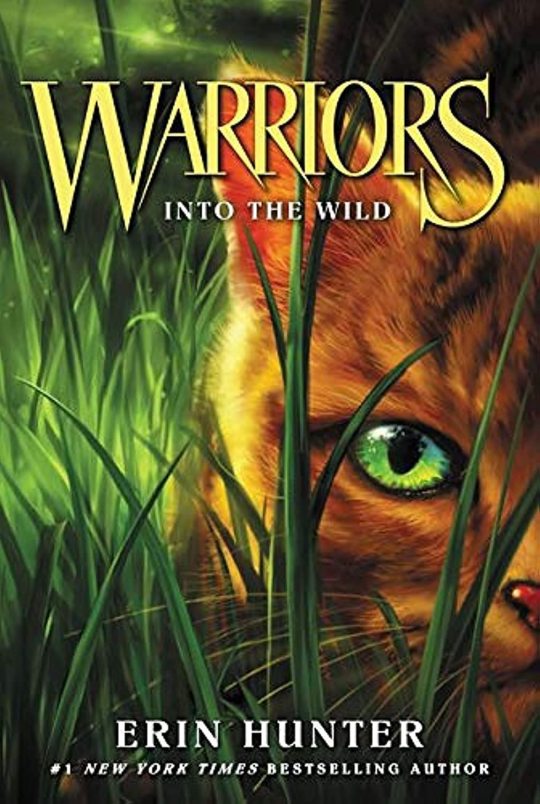
“Yellowfang will be allowed to stay here until she has recovered her strength. We are warriors, not savages…” Warriors: Into the Wild (book 1)
Savages...indigenous people, they aren’t warriors, they would’ve killed Yellowfang, and left her to rot in the wilds, Thunderclan is better than those monsters. Am I making my point clear enough when it comes to the history of this word, who it’s targeted against and how it comes across when reading in children's media?
You might’ve noticed I’ve mainly been using examples when it refers to a group of people, not necessarily showing off how commonly it’s used as either an action or an object because honestly...those are just kind of dumb. A savage roar? What does that mean?
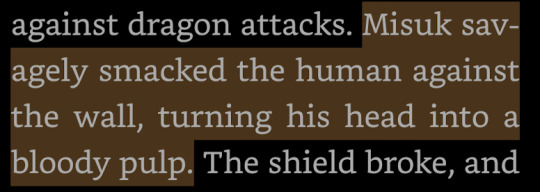
Ah yes, because we really needed the use of the word “savagely” to get the point across that Misuk just destroyed a person's skull. The “turning his head into a bloody pulp” wasn’t enough on its own. Without the use of the word savagely how else could we get the aggression and power across? When savage is used as an action it’s mostly because said character loses control of their humanity. They become savage when they attack and the end result is a bloody mess because that’s the only way indigenous, I mean, monsters, I mean barbarians, I mean savage people know how to fight. You often see these kinds of moments when the good guy who’d never hurt a fly loses control and unleashes hell, they turn into something that’s not themselves, they turned into a savage and these moments are meant to be shown as shocking as the character forgets who they are for a couple of seconds.
Indigenous people were savages, with savage strength, and a savage kind of culture. They scalp people, beat them to a bloody pulp, and ate your children. Those monsters needed to be killed. Whenever you use the word savage, it circles back to a group of minorities who were just trying to survive. This word has been used so much, that I don’t think many people realise the history behind it, which is why I said I’m not hating anyone who uses it, but please try to get a sensitivity reader. Get disabled and indigenous sensitivity readers, even if there’s no indigenous or disabled representation in your books, the words you use, still affect us and it’s a good thing to be aware of the words of which you speak and write.
Please be aware of these words, especially if you’re writing stories meant for children because the more children see these words, the more normal they’ll think it is and the more often they’ll start repeating it. I think there’s a time and place for these words, but saying them as an excuse to make something more shocking, isn’t the time or place.
#writing#writeblr#book#books#disability#disabled#writers on tumblr#dragon#writers#write#writers and poets#writerscommunity#creative writing#book writing#on writing#writing advice#writer#cw: c slur#c slur#s slur#disability in media#dragonfire sphere of eternity#dragonfire#lj davies#erin hunter warriors#Tail of revenge Celestial Heir#Chester Young#A Dragons Chains#A Dragons Chains The Remembered War#robert vane
40 notes
·
View notes
Text
People are starting to recognize that disabled characters should be played by actors who are actually disabled themselves. But I've noticed a new trend -- actors whose disabilities are less severe than the characters they play. What do we think about that?
I was watching Bodies on Netflix last night. There is a character who is a cop in 2053 and she has a disease that causes paralysis, but uses a sci fi device to walk. Her half-brother, a wheelchair user who has the same disease, calls her a sellout and says the work she does for the shady future government to earn the device isn't worth it. Two disabled characters talking to each other! An interesting scene! The sister is played by an abled actor, but I was curious about the brother character. I looked him up and learned that Edwin Thomas is disabled; he has CP. I also learned that his disability is invisible/he has played abled roles in the past.
And that reminds me of Matthew Duckett, who recently played Crutchie in the West End Newsies, a character who (you guessed it) uses a crutch. For what it's worth, I love him in the role and he has been widely praised for bringing authenticity. Duckett also played Claude Chatterly on the Netflix Lady Chatterly's lover, who is paralyzed and uses a wheelchair. Duckett has CP and does not use a mobility aid.
Here's one that's personal to me. I am visually impaired. One time I looked up my own condition and I learned about an actor who also has it -- his name is Ben Mehl -- who played a totally blind person on a show called You. (I have not seen this show and have nothing to say about his performance.) I read an interview with him and he talked about practicing doing things blindfolded, observing blind people outside their homes (!!!) and being taught by a trainer to use a white cane.
Living with vision loss can be hard; it really sucks sometimes. I feel a sense of solidarity with other disabled people as well as curiosity and (as you can see from this long-ass post) a sense that I have a vested interest in how disabled people are represented in media. But I DON'T know what it's like to be totally blind, and clearly Mehl doesn't either. Reading his interview reminded me so much of reading interviews with sighted/nondisabled actors who take on disabled roles.
I have heard it said that it's not anyone's business how an actor's disability affects them offstage, and I can sympathize with that perspective. But it shuts down the conversation. The studio is allowed to make a big deal about how authentic their casting is for promotional purposes, but no one can ask questions or talk about it?
Let's zoom out for a second: why do we care if disabled roles are played by actual disabled people? I would say for two reasons. 1. Authenticity. These actors can play the roles with greater sensitivity and accuracy, showing audiences what disabled bodies and disabled movement really look like and even potentially correcting mistakes that nondisabled scriptwriters and directors have made. And 2. Equity. People with disabilities should get to be on screen and on stage more often, they should have more opportunities.
But if the actor's disability is not the same as the character's, will the portrayal really be accurate?
And if someone with an invisible disability or lower level of impairment takes these roles, what roles will be available for actors with more severe impairment?
Note that I am not criticizing the choices or the performances of these particular disabled actors! (Except maybe Ben Mehl for creeping around outside people's apartments...) Instead, I'm questioning the motives of the people who hired them.
ALSO, is it just me or wouldn't it be cool to see people with different kinds of disabilities depicted in media? It seems to me like 90% of the disabled people on TV are paraplegics or quadriplegics. What about, like, everyone else? What if we cast more people with CP as ... people with CP? What if there was a person in a movie who couldn't recognize faces or drive, but could see a little, like most blind people can in real life. Sadly, I have never seen that in media (except for Butchie on The Wire, played by S. Robert Morgan, a VI actor, love that guy.)
Did anyone read this far? I would honestly be shocked. But let me know what you think.
#disability#disability in media#disability rep#edwin thomas#bodies#bodies netflix#matthew duckett#crutchie morris#newsies#uksies#ben mehl#you#visually impaired#s. robert morgan#the wire#lady chatterley's lover
40 notes
·
View notes
Text
"Feral" Tropes
For Clarity: I have written pretty much every single trope on this list at some point or another myself.
(Yes, including extremely ill-advised arson, non-verbal and illiterate Link, needs help with his hair, and spends weeks in blood-stained clothes.)
These can be funny tropes, dark tropes, ironic tropes, heartfelt tropes, and cathartic tropes.
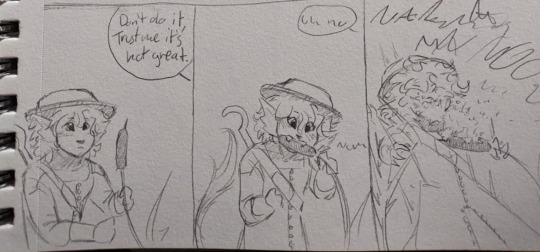
[Art of my Minish Cap Link, by @l3ominor]
Why do people find “Feral” link so polarizing, then?
I’m gonna go over what makes a fantasy, character agency (or deliberate lack thereof), and – because I’m AO3 trash forever, and because I think it’s the most useful thing here – tagging.
It's also like 2000 words, whoops.
I’m using “feral” here to say that Link is positioned as either failing to adhere to expected social norms, or positioned as outside them. Social norms are part of civilization: a structure of rules and expectations that are positioned as the “height” of human social achievements. Meeting them makes you a good, normal person who is respectable and respected; failing them can make you anywhere from imperfect to exile to enemy.
“Civilized” is a moving target that’s defined by others. Anyone, at any time, can be constructed as a failure just because someone wants to do that. Similarly, other features – like slavery and war crimes – can be considered “civilized” because that’s just what the dominant power does. Being “civilized” isn’t inherently good; it’s also not inherently evil. Civilized social rules also include stuff like charity, hospitality, and similar social welfare stuff.
Basically both “Civilized” and “Feral” can mean whatever you want them to mean, but there are some common ways it goes wrong.
Again. I have written 90% of these in various ways. These are not inherently wrong; the frustration often arises from presentation and lack of clarity, which I’ll address below:
The first is infantilizing the character, creating them as helpless.
Wild can’t bathe himself and doesn't see the point in being clean; he doesn’t do anything with his hair. He’s so dumb he eats rocks; he'll eat too much or anything at all, and he has no objection to being treated like a child. He doesn’t know language or how to read or write. If transmale, he doesn't understand his period and thinks he's dying. He was literally raised by a wolf. He can't do anything right. It's presented as fair and just to pin him down to clean him, because he cannot do it himself.
The fact the wolf is supposedly Twilight, who should be striving to get him to other hylians is irrelevant. Real youth react to their period thinking they’re dying, but this is associated with literal children, particularly ones raised completely ignorant of their own bodies and of sex.
The second is othering them, treating them as antisocial.
Other people react badly to him; he has no manners, he smells; he never tells anyone what he's doing. He's afraid of other Hylians; he's indifferent to them, and wants nothing to do with them. He doesn't understand how to function in a group. He'll wander into a trap carelessly, and drag others with him in pursuit of something pointless.
In the case of Hyrule, he lives in a cave and this is strange, bizarre, and horrible, rather than a thing that is in the actual historical record and is a dry, temperature controlled and easily protected place to sleep.
The third is to make them dangerous, a savage thing.
He solves his problems by lighting things on fire, uncaring of the damage done. He bites and growls when upset. He'll kill a monster with his bare hands; he'll show up in town covered in blood and filth.
He's an abomination; he's literally not human at all.
IIII
Probably you read that list and had checkmarks going off in your head. I like that one; I don’t like that one. People never do that right; I’d handle this way better if only—
Good. It’s a fun list of things that can be good, if done to your taste.
A lot of these touch into disability tropes; some edge into racialization ones. A lot are dehumanizing. People have a lot of feelings about both, good and bad, and feeling your way through it by writing is normal, expected, and okay. You do not deserve to be punished for writing something “bad” while trying to understand what you like. Many of these fall under care-taking tropes: someone needs help, and they feel awkward asking so they just want someone to step in and “Fix it” without the humiliation of having to ask.
That’s fine. But if you want to change it up: let Link ask. Let him reach out. Let him initiate the help. There’s a very different feeling when someone pins Wild down to clean him, versus when Wild works up the courage to ask “Can you help me?”
Because yeah, brain damage is complicated. He could have just about any struggles you imagine, but what can be frustrating for others seeing this, over and over, is that he’s treated like a permanent child or an animal. He always will need taken care of; he always needs someone to step in. It is right and just to force him to submit to care against his will...
He never has anyone ask if they can help him, either.
How much sweeter can the care be when he’s willing? When he initiates? When he has agency in his own treatment? Because too many people who need help are not given that choice. Some readers are turned off because the force is all too real, and all too painful to see reflected in what they came to for escapism. One person’s care-taking fantasy, is another’s real life trauma.
Escaping society and it’s pressures is also a fantasy, one of independence and freedom all its own but again, a major feature here is choice. Does Wild have choice? Does Hyrule? Is this presented as of course they don’t belong, or as a reasoned decision, or as a result of being driven out by real violence from others?
All different stories. All different fantasies.
And being the agent of violence is a fantasy, too. “Burn it all down” is a valid emotion (I write variations on it myself, although not this one.) Think of “Kill Bill” and “Fury Road.”
But with an ostracized, feral Wild there is the reflection of real violence against the marginalized communities whenever they express frustration or rage at their treatment. The wrong person being dangerous can get them killed. Of course this is polarizing.
Ironically, this category includes the one trait that Wild displays in the Linked Universe comic that didn’t make the feral list: emotional dysregulation. He loses his temper; he lashes out. He gets upset and jumps the gun... but it’s not cute, it’s not pretty, it’s presented very well in canon (Warriors is frustrated with him, but not seriously angry.) But it doesn’t suit the feral take, because it’s too mild for the violent fantasies, and too adult and human for the innocent ones.
IIII
My first advice about writing this is to be more clear about your tags. Spoilers are always a thing people worry about, but some things can be improved with clarity, and conflict over “bad writing” is one of them. “Feral” Link can mean literally any combination of the above, but those are all wildly different things. Narrowing down what happens in your fic into more specific tropes will both help people who want to read what you write to find it, and help people who will be upset avoid it.
It just common courtesy. I tagged a recent fic “Drunk arguments”+ “Politics” because that argument could go a lot of ways. Someone who’ll read political nonsense may not read sex and may not read crack. It doesn’t say anything but the subject matter, and it doesn’t need to: the question of whether this will turn into politics or sex is a way to direct people in or away according to their taste.
Is this required? No. People make mistakes or have bad days or just don’t want to, and don’t deserve punishment for it. But it’s a tool at hand to filter your readership to better match you, one you shouldn’t disregard.
If you want to adjust how you write, frequently the aggravating factor is in the presence (or deliberate absence) of agency, and in evoking sympathy over pity. There’s also a way to balance traits in just like, the general sense of making the story more complex: nobody is one thing.
For an example from my own projects, I write my version of Minish Cap Link combined with the first Four Sword game. The second time he used the Four Sword changed him into something not-quite-human. But even prior to that, he was non-verbal and skittish; he bit and hissed, he has visible injuries on top of the later changes. I have two fics that present two different ways to frame much the same event: he gets upset and lashes out, and legitimately terrifies the people around him.
In one story, he is restrained. The people doing so are treated as villains for it; you see his fear and panic, and Zelda’s rage over his treatment. In the other, he is calmed by another of the Links, and even in an outside perspective it is made clear that Minish is reassured, relieved and desperate for comfort once his fear has passed – and he trusts the person who talked him down (who did not hurt him) to give it now. He doesn’t have to “behave” to be treated as human, but I also don’t have to make him act “normal” to do so: the framing of how he’s treated by others does it. He’s also clean, well-kept, polite, sweet when he’s calm, and playful.
Similarly, because I have multiple characters who are all non-verbal to varying degrees, I can get away with a lot of variety. I can make one a total bitch, and I don’t have to worry that he’s going to be “bad” representation because if people don’t want a bitchy non-verbal character to relate to, there’s two others to choose from. Balancing a “feral” trait with a mix of signals creatures a nuanced character that isn’t just a ball of Whump.
(Although again: nothing wrong with a ball of Whump if you’re in the mood for it. I have my balls of Whump fics, too.)
Some of the other weird things can be done as just misunderstandings: Is Link eating rocks because it’s polite to join the gorons? Did he realize he was weird and could eat rocks as a child and now does it to joke around? Does Hyrule get to be exasperated at the others pitying his cave? Letting the weird be weird but legitimate can be fun, or even funny: Hyrule lets the others sleep cold in tents while he’s warm inside.
Readers get tired of one-note characters no matter what they’re like. I’ve heard the same complaints about “Dad” Time as I’ve heard about “Feral” Wild, and about Twilight. The fix isn’t to throw out what you like; it’s to build it up into something more. It will never be to everyone’s taste, but you can have a dirty little gremlin who, no matter how inhuman they may seem, is still treated like a person.
Dehumanization is far too prevalent in the world right now, and a lot of us desperately need somewhere to escape it.
Now I’m gonna go write me some fluffy Wild asking for hair brushing. After spending all week chewing on this, it sounds like a fun challenge.
#Linked Universe#Hello it's me again#but people did ask#this is opinion not prescriptivism#LU Wild#LU Hyrule#Zelda fanfic#BOTW#TOTK#disability tropes#disability in media#dehumanization in media
34 notes
·
View notes
Note
Once you have magic in a setting, it makes no sense to have disabilities. The only way you could make this work is if you make the magic extremely rare and difficult to obtain or make it so that magic is so dangerous and unreliable that it rarely gets used.
In other words you would have to heavily tone down the "fantasy" in high fantasy which kind of defeats the purpose. A "low magic" fantasy setting can work but it requires good writing to make it interesting.
These are their exact words. They really just fail to conceive that maybe a setting can have wide spread magic e that still have limitations.
That is hands down the dumbest take I've ever heard. If this dude thinks magic should be used as a cure-all to make sure no character is ever seriously or permanently hurt, they're just a bad writer in general and a bad fantasy writer in specific. If people can't become disabled in your world, then your characters can't be vulnerable and thus I have no reason to feel for them or worry about them.
I could name literally dozens of disabled characters in high fantasy. You're trying to tell me that Frodo's lifelong PTSD from his experiences on the quest is bad writing and he should just magic it away because "it isn't REAL fantasy if people are disabled"? Eat my ass. Disability is part of being human and you can't just excise it because you'd rather not look at it.
42 notes
·
View notes
Text
A lot of mini-bots (and quite a few other bots) have what might be considered neurodivergent traits (or have been confirmed as such), and I wonder if certain frame types or classes --or Cybertronians in general-- might have physically type-specific processor structures which allow for greater diversity of thought, and if some frame types or spark types might be more or less likely to have or develop neurodivergent traits
We know the Quintessons fucked with the Well of All Sparks in the Aligned Continuity which had unknown effects, and in IDW 1 given the spark as the core of a person's individual spirit (for lack of any better phrasing), it would make sense for Cybertronian sparks to imbue individual personality etc. while the processors are physical hardware with software flexibility to permit and adapt to those unique aspects of self
For example, in the continuities where spark development influences protoform development and therefore what type of frame a bot might ultimately have, it is still simultaneously possible to alter a frame to some degree with armour changes, mass manipulation, etc. (and in most continuities, alt-modes can be altered as well, to at least some degree within the range of someone's core specs)
But the processor and spark are the two things that generally (although we have seen some exceptions to this) cannot be physically altered without incurring significant damage-- Making them some of the few constant components in a species designed to physically change
Sparks have significant individual variation in terms of the personality etc. that evolves from each unique spark, so perhaps processors have some physical elements designed to best accommodate a certain frame type, while also allowing for individual experiences and perception etc. to form unique thought pathways for each individual -- This would allow for any Quintesson or Functionism-related frame alterations or requirements, while also still enabling a spark to produce a unique person as it forms and as experiences accumulate
Sort of like genetics vs epigenetics in human beings; Some things are physical and structural, but some things are informed by environment, experience, etc.
It's interesting that we do seem to see a lot of mini-bots specifically who might fall into a neurodivergent category or exhibit behaviours or thought process that might reasonably fall under the category, but of course it's not universal so there is still greater variation
Although characterisation varies from series to series, here's a couple examples:
Cliffjumper tends to have impulse control problems that are sometimes similar to ADHD impulse control problems, and he sometimes has difficulty prioritising or hyperfixates on one aspect of a situation, leading him to reach the wrong conclusion or focusing on the slightly wrong thing; He also struggles to manage frustration. This could all be related to something similar to executive dysfunction, as it commonly manifests in humans with ADHD.
Bumblebee seems to be conflict-avoidant to some degree in most continuities, and aside from that being part of his friendly nature and kind disposition, it might also hint at something similar to rejection sensitive dysphoria, or a greater sensitivity and emotional response to perceived interpersonal conflict or perceived failure. Some versions of Bumblebee have particularly struggled when faced with high stakes/high risk of failure scenarios, and he has a tendency to internalise blame, directing it towards himself even when a failure is not necessarily his fault or even truly a failed mission. This is often comorbid with Autism and ADHD in humans, but it can also exist on its own.
It's not just mini-bots; Misfire canonically has ADHD in IDW 1, Geomotus in IDW 2 is Autistic and his neurodivergency is even highlighted by other characters, and so on.
So all of this (and how it might work) varies from continuity to continuity, but I just like thinking about how neurodivergent bots do exist, and how that happens and how it manifests and how it is perceived by others and by society at large is interesting
In IDW 2, neurodivergency seems to be viewed in a more understanding and positive light. But in IDW 1, neurodivergency may be viewed in a more ableist way under the Functionist system, and in the Aligned Continuity, perhaps neurodivergency is seen as a potential indication of Quintesson alteration of the Well or of the individual themselves (this would depend on a bot's age).
We don't have too many details on Cybertronian medicine in general, but it's interesting to think about!
It's 8 AM I'm gonna go have a tea now lol
#long post#cybertronian medicine#minibots#maccadams#maccadam#medbay posting#idw 1#idw transformers#idw 2#aligned continuity#tf speculation#just thinkin#transformers#tfp#quintessons#disability in fiction#disability in media#tw brief mention of ableism
51 notes
·
View notes
Text
How The Owl House did amputee representation right before Eda ever lost her arm - Disability in Media
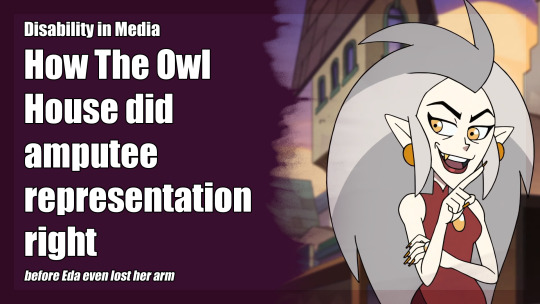
[ID: A screenshot of Eda from The Owl House, an old woman with pale skin, very large, grey hair and pointed ears in a red dress. Beside the screenshot on a dark pink background is text that reads "Disability in media, How the Owl House got amputee representation right before eda ever lost her arm." /End ID]
Dana Terrace's The Owl House has some of the best disability rep I’ve seen on a Disney channel show in a long time, with Eda, the main character’s mentor, being one of many stand-out examples.
Plenty of people have discussed how Eda’s curse and the loss of her magic can work as an allegory for disability and how refreshing it is to see a story (especially one aimed at a younger audience) who’s focus is not on her “overcoming” it, but learning to accept it as a part of her and go from there. Eda’s story tackles a lot of subjects that are often mishandled in other examples of disability representation, from the subject of parents who refuse to accept, to glass siblings and much, much more, The Owl House handles all these topics beautifully.
But one thing that dawned on me during my most recent re-watch of The Owl House is how well Eda (and later Lilith) worked as amputee representation, long before Eda actually lost her arm.
One of the side effects of Eda and Lilith’s curse is that sometimes their body parts, mainly their limbs, can fall off. It doesn’t hurt them, and Eda is seen removing them intentionally at multiple times in the series, but they can always be reattached.
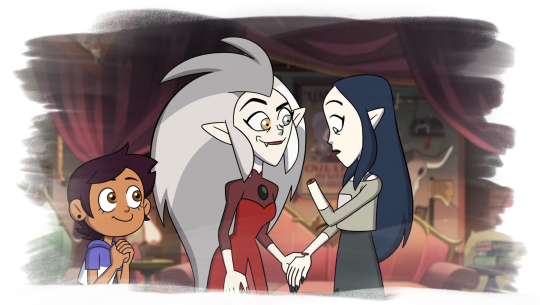
[ID: an image of Eda holding her sister Lilith's hand. Lilith is a pale woman with long, black hair, wearing grey clothes. She is looking at her other arm suprised, as her hand is missing. Luz, a Latina girl with short brown hair and a purple hoodie is looking on, smiling. /End ID]
While most likely unintentional, the way the show depicts this with Eda in particular is exactly what I wish more people would do with their prosthetic-using amputee characters.
Eda detaches her limbs, especially her legs, when they’re inconvenient or when she’s relaxing.

[ID: an image of Eda laying on the couch in a bathrobe, her hair in a towel. She has taken her legs off, throwing them to the other side of the seat. /End ID]
The fact that this is mostly played for laughs is actually a good thing in my opinion (though obviously, the show’s overall tone is part of that), as it shows the audience who are mostly children and teens, that in a world of weird and downright scary (from the perspective of the characters) things, this isn't one of them. It’s just a thing she and Lilith can do, and it can even be funny.

[ID: An image of Luz and Eda dressed as pirates. Eda is sitting on the ground, her legs detached and off screen somewhere. /End ID]
It does startle Luz and Lilith on a few occasions, but that’s more because they didn’t know the curse could do that, but once they’re introduced to it, it’s never really brought up as a big deal again.
I’d love to see more amputee characters who do this with their prosthetics. So often media is almost afraid to have amputees take their prosthetics off on camera or on the page. For some folks, our prosthetics are like a part of our bodies, but that doesn’t mean we never take them off. Show your leg amputee flop on the couch and throw their legs across the room. Have them go without on occasion, not because they have to, but because they just don’t feel like putting them on.
Likewise, the owl house creators never shy away from showing Eda when her limbs aren’t all attached. A lot of media, and kid’s shows in particular, will avoid having an amputee character’s stump visible if they ever do take their prosthetics off - treating that part of the character’s body the same way they treat gore or nudity. I’ve talked before how this actually does have a real impact on how kids in particular react to amputees - I’ve legitimately had kids I worked with cry when I took my prosthetics off, then immediately calm down when they see there’s nothing "scary" under my socks.
As much as I love How To Train Your Dragon, it’s very guilty of this. Hiccup looses his leg at the end of the first movie, and wakes up with his prosthetic already attached. The Netflix series has a few instances where he has his prosthetic off, but the camera almost always avoids showing it until he can cover it up again, or is super zoomed-out so you wouldn’t be able to “see anything”. To their credit, they do get better with this in the last movie (though it's still always covered), but for the majority of the series, they are very reluctant to have any shots where hiccup’s leg is in view without the prosthetic (unless they’re very far away).
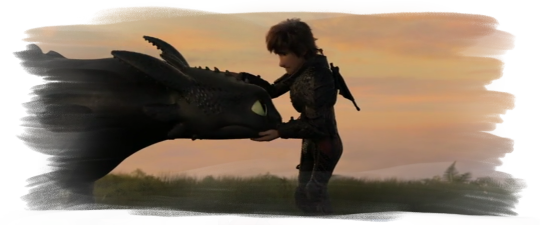
[ID: a screenshot of Hiccup from How To Train Your Dragon 3, a white man with short brown hair, and one leg missing, wearing armour made of black dragon scales and no prosthetic. He is holding onto toothless's head, a black dragon. /End ID]
Ironically, Eda does (permanently) loose an arm at the end of season 2, but I don’t really have much to say about her as amputee representation on that front, since she’s absent for a lot of Season 3, and when we do see her again, everything is so hectic, the story doesn’t really have any time to focus on her missing limb (which is reasonable). I will say, I do appreciate that they kept the amputation when she's in her owl-beast form in the finale, but there's honestly not much more to say about it. We do see her again in the epilogue after she’s had some time to settle into the amputation, wearing a hook prosthetic, but it’s, once again, too quick to really say anything from a representation standpoint. There's a few little nit-picky things I could bring up, like the fact they seemed to change the type on amputation she had (when she looses it, we see the split was very close to the elbow, but in the epilogue she has most of her forearm again) but those read to me more like animation mistakes or an odd prosthetic/clothing designs rather than a representation issue - and as someone who's worked in animation, given the stress the team was under for the finale, I'm not really worried about it. Like I said, it's more nit-picky than anything.

[ID: A screenshot of Eda, her hair tied back and wearing a red robe and a hook for her right hand. /End ID]
Despite all that though, I still think Eda is still good amputee representation, but mostly because of how they depict her curse’s side effects rather than her actual amputation. She’s honestly one of the only characters that I think you could refer to as “amputee coded” (outside of maybe Teen Titan’s Cyborg), and I genuinely wish more creators would treat their actual amputee characters the same way the Owl House treats Eda in that regard.
#Writing disability with Cy Cyborg#Writing Disability#Disability#Disabled#Disability Representation#Writing#Writeblr#Authors#Creators#Writing Advice#Disabled Characters#On Writing#Disability in Media#The Owl House#TOH#Eda#Owl House#Eda The Owl House#eda clawthorne#eda the owl lady
652 notes
·
View notes
Text
Thoughts and feelings about Izzy in s2ep4 and what it means to me as a fellow disabled person:
Yeah, so, that episode, huh?
You know, I already knew going into this new season that Izzy's storyline is going to hit me hard regardless of the exact little plot points it might have, but it's only now, several hours after I've watched eps 4&5 that I'm really starting to digest what his story means to me in it's current shape. This is... a bit long. I also mention a character from a different show - Isaac from Sex Education.
Izzy has always been a bit of a dick, right? That's the reason a lot of people hated him in the first season.
Well, now he is a bit of a dick and disabled. And let me tell you how fucking ecstatic I am about that.
You see, looking for disabled characters in media I consume has rarely been gratifying - if they are there at all, which already is rare, they have very little to do, and if they're even semi-important, they're almost always the epitomes of goodness. Nice, understanding, quiet, patient.
Barely there.
The first time I truly felt something change in this area was with the appearance of Isaac in Netflix's Sex Education. He's sarcastic, funny, talented, honest and mean.
The fandom of that show hated Isaac, let me tell you.
It was mostly because he took direct action to separate the main ship of the show that had many people obsessed. As you'd expect. People's ableism immediately jumped out. As you'd expect.
Because how dare he have his own motivations and wants, and to do what he thinks is right?
Barely there.
And now we have Izzy. Izzy, who also did what he thought was right, which in s1 of the show was trying to separate Ed and Stede. He wasn't trying to make himself too likeable at any point (well. when the crew almost mutinied on him in s1 he did do a last ditch effort but. you remember how well that went).
My point is that now we have someone who isn't particularly nice, and now he's dealing with a sudden loss of ability in his body, which is going to make him even worse. He's angry! Of course he is! He's hobbling around with half a leg gone, humiliated, exhausted, barely recovered from impromptu amputation, no anesthesia. And a suicide attempt! He's angry at himself, his body, at Ed, at Stede, at God if he still believes in one, and who knows who else.
He isn't suddenly going to become nicer to people just because. He doesn't need to be humbled.
(a little sidenote: I do not accept the reasoning that Izzy somehow deserved to lose his leg, that "oh what did he expect riling up Ed when he was heartbroken?" etc. He wasn't expecting to get shot in the fucking leg. Nobody fucking deserves that, and if you think that Ed shooting him in the leg and Izzy subsequently having to have it amputated was an "appropriate punishment" for "what he's done", you're just cruel and wrong. Now scram.)
But that's the point. Disabled people deserve help regardless of whether or not we are nice.
Thankfully (not from Izzy's point of view - his pride was definitely bruised in that moment) the crew saw him struggle, and acted in kind. Because Izzy is their dick. And now - also their unicorn.
And it means so much to me that we get the representation of disabled people who thrash around and rattle the bars of their societal cages, furious at the world that isn't welcoming to us, and receive love and care and an invitation to a loving community regardless.
We shouldn't have to be here just when ableds are ready to give. We aren't meek vessels for your good will. Izzy is such a painfully realistic (as far as the universe of the show permits, given it's unavoidable goofiness) portrayal of the anger of someone who's lost some of their body's past ability, and how one might deal with it.
And I really wanted to say something about that, because I'm afraid it might get lost in the discussion about the more popular and more easily digestible aspects of the show.
#ofmd#our flag means death#izzy hands#ofmd s2#ofmd s2 spoilers#long post#disability#ableism#disability in media#tw suicide attempt#ofmd meta#ofmd s2 meta
168 notes
·
View notes
Text
Saw some folks on twitter headcanon that Suletta and Miorine haven't had their official wedding ceremony yet because "Suletta still has crutches so they're waiting until she's done physical therapy" as if
They didn't have to find a way to keep Suletta from dragging herself out of the hospital bed the moment she woke up to go marry Miorine and
Given she has permanent scarring all over and she still needs crutches 3 years on, it's very likely she has permanent mobility issues and will still need crutches or some other mobility aid in the future. They might be able to do something using GUND technology but it looks like that's still in the experimental stages.
I don't think crutches or a wheelchair would stop Suletta from going down the aisle, especially with how generally respectful the show is towards disabilities when they're brought up. The folks saying this stuff seem to just not be considering the implications so I'm not actually mad about it, but still, disabled people can still get married.
#g witch#g witch spoilers#sulemio#disability in media#obviously in places like the US there are issues with marriage and disability benefits and the like#but given that aside from the existence of megacorporations the setting seems to be mucj more progressive#id like to imagine that those issues are not a problem in the show
112 notes
·
View notes
Text
So something I’ve been thinking about with Hi-Fi Rush is that clearly there’s disabled characters and none of it is ever made into a Big Deal.
Yeah, Chai got a prosthetic arm. It’s wicked cool
Yeah, Peppermint lost a leg. There’s some potential lore there
Yeah, almost everyone else has Vandelay parts but we never even learn why or if they’re just meant as enhancements. For example, does Zanzo have the neural implants just to get his ideas out of his head faster or because he needs that accommodation? It’s never addressed because it doesn’t really matter
The game never makes disability or accommodation feel weird, out of place, or negative. It just…is
HOWEVER, Chai is blamed for being “defective.” Throughout the game he is reduced to being known as “the defect” that needs to be wiped out (or experimented on/with in Zanzo’s case).
None of this is Chai’s fault. It’s Kale who threw the music player into the Armstrong machine and yet Chai is blamed for it. At one point Rekka even says that HE ruined her perfect no defect record as if his existence was the mistake and it’s his fault.
Anyway, as a disabled person, I think this was a wonderful way to bring in ableism and what being disabled can look like in the world into the story while keeping the upbeat, fun vibe of the game.
I think every disabled person has felt blamed for simply existing (either people think you aren’t doing enough to “fix” yourself or you must have done something wrong to cause your disability or you’re even just making it up/being lazy/etc). It was so nice to see that reflected in the game while still seeing all of these disabled characters kick absolute ass in fights and also just exist in the world.
#hi fi rush#hi fi rush chai#hfr#hfr chai#hi-fi rush game#hi fi rush rekka#hi fi rush kale#disability#disability in media#disability in games#ableism in media#ableism in games#hfr zanzo#hi fi rush zanzo
129 notes
·
View notes
Text
Disability and the Last Twilight ending
Much as I loved Last Twilight, warts and all, I was disappointed at some of the choices they made surrounding their depictions of disability and Day's path through it.
I'm writing as a person with a disability, but not blindness (or deafness for that matter).
We don't get a lot of depictions of disability in fictional media. That places a lot of our hopes that any particular depiction will get it right:
that characters with disabilities either have already found a way to live well (Rear Window, Wait Until Dark, Not Me) or learn to work within it (Moonlight Chicken, Last Twilight through the end of episode 11).
that we don't get an unrealistically perfect or heroic depiction of a person with disabilities.
that the person with disabilities' success and happiness is not dependent on a savior, although they can get help from others.
that a happy ending (if the fiction is to end happily) does not depend on curing the disability.
that if the fiction is a romance, that the person with disability ultimately has approximately equal agency with their partner, who might be abled or disabled.
that we get to see main characters that fulfill the above desires.
I think Last Twilight came through on the first two points, and one can argue about the third, but failed on the last three.
Day, while blind, opened a bookstore. While the bookstore has print books, there are also activities for blind people. (yay)
Day is imperfect. (yay)
Day's life is changed for the better by Mork's help, and continues to improve once Mork has been booted out of Day's life. (open to debate)
Day's blindness was cured. (sigh)
Day didn't have equal agency with Mork pre-break-up. He could only get his agency by breaking up with Mork, and subsequently, by regaining his sight. (sigh)
Aon, a fairly minor character, fulfilled the first three desires, but Day, a main character, did not. (In Not Me, Yok's mother is a fairly minor character. In Moonlight Chicken, Heart is one of the side couple.) (sigh)
If we had plenty of depictions of people with disabilities, most of which satisfied the first several desires I listed, and we also regularly got lead characters with disabilities, then Last Twilight's failings would not be a big deal.
But we don't.
And Day's blindness was a central part of the plot.
I'm not angry about this. I'm disappointed.
There are other failings which bloggers have raised, such as Mork's apology to Day and Day failing to apologize to both Mork and Night - seems like we just got through discussing that sort of thing about Only Friends (more sigh). So I'll focus on what I see as other failings involving disability.
Day gained additional independence by acquiring a cane. So why wasn't he using it when leaving the hotel in episode 12? Beyond setting up the plot point of Mork helping him, that is.
Lack of Thai Braille in Day's bookstore. (Although, given the technology that Day demonstrated - as when he read Mork's contract on his phone - perhaps Braille is less important than it once was.)
Actually, why wasn't Day using the cane in the bookstore so he doesn't accidentally walk into or grab a customer?
Actually, why didn't Day get a cane much earlier?
Or use tools such as a Braille embosser, something that's been around for years and years?
We don't see Day asking the blind guy if he wants help crossing the street, good etiquette for interacting with a person with a disability, presumably because the writers don't want us to know he has his eyesight back until they get across the street for a delayed reveal.
I'm hoping that, as with the increasing depiction of queers in media being accompanied by an increasing percentage of positive, layered depictions, that we'll see a similar increase in positive, layered depictions of people with disabilities.
#yaoi#thai ql#thai bl#pandasmagorica#last twilight meta#last twilight series#last twilight the series#last twilight#disability#disabilities#Disability in media#blindness#blind
20 notes
·
View notes